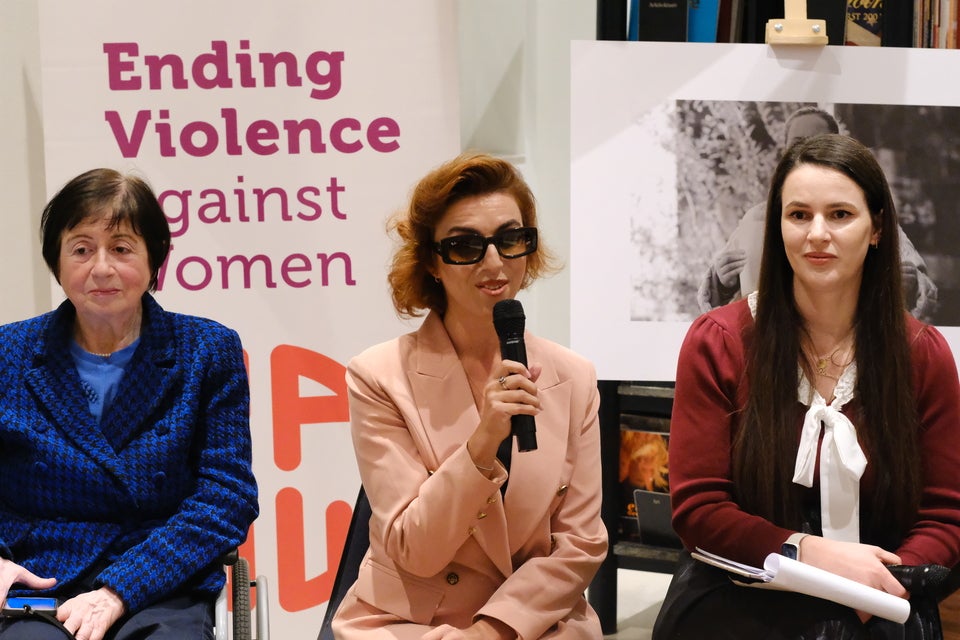Violence against women and girls with disabilities: critical challenges that need to be addressed!
Women and girls with disabilities in Albania are not only faced with physical and structural barriers but also with the often less visible yet pervasive threat of gender-based violence. On the International Day of Persons with Disabilities, they shared their stories of resilience and demonstrated their potential for leading dignified lives, despite numerous challenges.
Date:

In the framework of the 16 Days of Activism, the Albanian Disability Rights Foundation, in collaboration with UN Women and the Government of Sweden organized a meeting where activists, policymakers, and advocates shared the most urgent challenges encountered and how they can be addressed effectively.
Blerta Drenofci, Executive Director of the Albanian Disability Rights Foundation, opened the discussion with a speech that shed light on the daily struggles of women and girls with disabilities.
"Women and girls with disabilities face increased disability-related violence – a situation which is compounded by limited awareness and capacities within the support systems. Key challenges include inaccessible services and institutions, inadequate resources for victim support, lack of information about their rights, dependence on abusers, and an absence of supportive services to enable independent living."
Among the many urgent needs highlighted by Ms. Drenofci was also the lack of regularly updated disaggregated data on people with disabilities. She emphasized the importance of improving the data collection and reporting systems on violence against women, with particular focus on women and girls with disabilities.
Doliana Velia, a participant in the meeting and a passionate Disability Rights Advocate who is visually impaired and currently works as a counseling psychologist in the Department of Social Services within the Tirana Municipality, shared the challenges that many women with disabilities face, particularly in addressing abuse.
"I recall the case of a mother with disabilities who said this in response to the slogan 'Report violence,' I showed her: 'I can't possibly report it because I am being abused by my daughter, who also has intellectual disabilities.'’ In this case, reporting abuse would not serve any purpose, because the abuse is not intentional. In such cases, therefore, there is a need for interventions by multiple institutions in order to provide the comprehensive support needed," Velia explained.
Ms. Bardhylka Kospiri, former Deputy Minister of Health and Social Protection, addressed the meeting both in her capacity as a renowned activist in the field and as a woman with a disability herself.
"Violence manifests itself in many different ways. There are many women and girls with disabilities who remain silent because they do not even know how to articulate the violence they are experiencing. Often, they lack the means to do so, such as in the case of girls and women with hearing and speech impairments who lack the services of an interpreter to voice their complaints and report the abuse. Others face prejudice, especially those with mental health issues. Their families are afraid to let them venture out of the house due to psychological violence and discrimination."
One of the contributors to the UN Position Paper on Violence against Women with Disabilities, gender equality expert Monika Kocaqi, raised some questions:
"You mentioned cases of violence and the first thing that caught my attention is the process that is set in motion the moment a report is filed. Do we have a form that is understandable and accessible according, using language that is adapted to the type of disability? How prepared are police officers or local coordinators to communicate with these groups? In cases of gender-based violence, this information must be updated at every step."
In response to this critical issue, the United Nations System in Albania has called for action at all levels, the legislative, central and local government, the judiciary, national human rights institutions, service providers, CSOs, and the international community. Some of the main recommendations include: strengthening the implementation of the existing legislation and further alignment with international standards. In addition, ensuring accessibility of services and funding for organizations supporting survivors, training service providers on disability awareness, fostering public awareness, and fostering inclusion in decision-making are other critical components of an effective response.
This event was organized in the framework of the UN Joint Programme, Ending Violence Against Women and Girls in Albania, implemented by UN Women, UNDP and UNFPA with the financial support of the Government of Sweden.